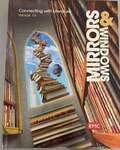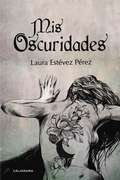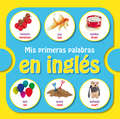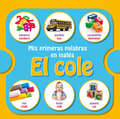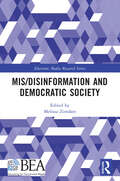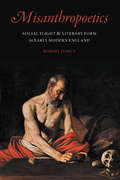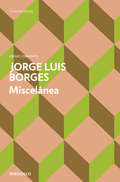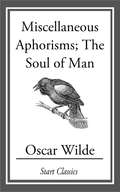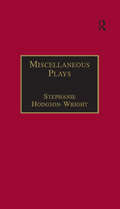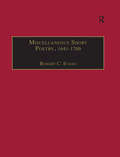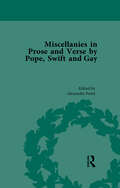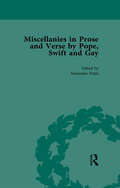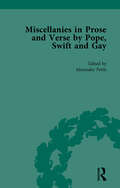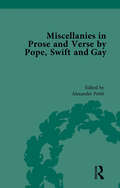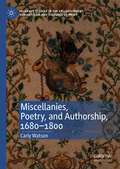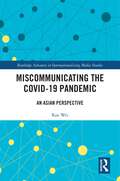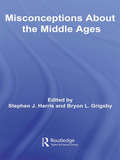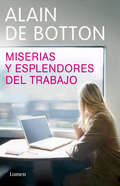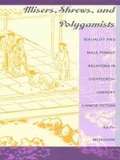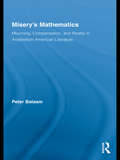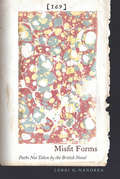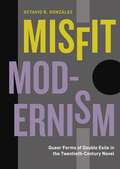- Table View
- List View
Mirrors and Windows: Connecting with Literature (Level II)
by Emc Publishing"... Mirrors and Windows: Connecting with Literature, provides opportunities for you to explore new worlds full of people, cultures, and perspectives different from your own. This book contains stories, essays, plays, and poems by outstanding authors from around the globe. Reading these selections will expand your appreciation of literature and your world view. Studying them will help you examine universal themes such as honesty, integrity, and justice and common emotions such as fear, pride, and belonging."
Mis oscuridades
by Laura Estévez Pérez¿Te atreves a dejarte fluir por tu vacío? <P><P>Supongo que todos nos hemos encontrado de frente con ella, a veces va de paso, otras, se queda una temporada. Las noches son de luna nueva, donde todo es oscuro, donde las estrellas intentan iluminar el oscuro cielo sin la luna. <P>¿Qué se hace cuando todo es oscuridad? <P> Tenemos que buscar nuestra propia luz, la que guíe e ilustre nuestro camino. Somos pequeños luceros en busca de su luna, devorada por la oscuridad. La oscuridad trajo vacío.
Mis primeras palabras en inglés
by Autores VariosLibro de fotografías para que los niños aprendan sus primeras palabras en inglés y en castellano. Aprende conceptos básicos de manera sencilla y divertida en castellano y ¡en inglés! Mira las fotos y lee en voz alta las palabras, verás qué fácil es. Aprende los colores, las formas, los números, los animales, las estaciones y mucho más# ¡El inglés es divertido! Learning English is fun!
Mis primeras palabras en inglés: el cole
by Autores VariosLibro de fotografías para que los niños aprendan sus primeras palabras en inglés y en castellano. ¡Buenos días! Good morning! Aprende de manera sencilla y divertida un montón de palabras en castellano y ¡en inglés! Mira las fotos y lee en voz alta, verás qué fácil es. En clase, en el comedor, en el patio, en el parque# ¡El inglés es divertido! English is fun!
Mis/Disinformation and Democratic Society (Electronic Media Research Series)
by Melissa ZimdarsDrawing on a variety of perspectives and methodologies, this collection explores the intricate relationship between mis- and disinformation and the functioning of democratic society.This book seeks to show how mis- and disinformation is destabilizing our collective confidence in institutions fundamental to the functioning of democratic society, including our electoral processes, our perceptions of trust in government officials and institutions, our healthcare, education, economic, and media systems; and even our communities and interpersonal relationships. Topics covered in this book include the role of Artificial Intelligence in automating deception; how financial crises and journalistic norms in the news industry create favorable conditions for the amplification and laundering of political disinformation; and how our emotional states impact our susceptibility to misinformation. Throughout, the authors provide nuanced definitions of key terms such as “conspiracy theory” and “digital democracy” which help level the field for future research.Mis/Disinformation and Democratic Society is recommended reading for researchers and advanced scholars in this dynamic area of study.
Misanthropoetics: Social Flight and Literary Form in Early Modern England (Early Modern Cultural Studies)
by Robert DarcyMisanthropoetics explores efforts by Renaissance writers to represent social flight and withdrawal as a fictional escape from the incongruous demands of culture. Through the invented term of its title, this book investigates the literary misanthrope in a number of key examples from Shakespeare, Jonson, Spenser, and the satirical milieu of Marston to exemplify the seemingly unresolvable paradoxes of social life. In Shakespeare&’s England a burgeoning urban population and the codification of social controls drove a new imaginary of revolt and flight in the figure of the literary misanthrope. This figure of disillusionment became an experiment in protesting absurd social demands, pitting friendship and family against prudent economies, testimonies of durable love against erosions of historical time, and stable categories of gender against the breakdown and promiscuity of language.Misanthropoetics chronicles the period&’s own excoriating critique of the illusion of resolution fostered within a social world beleaguered by myriad pressures and demands. This study interrogates form as a means not toward order but toward the impasse of irresolution, to detecting and declaring the social function of life as inherently incongruous. Robert Darcy applies questions of phenomenology and psychoanalysis, deconstruction and chaos theory to observe how the great deployers of literary form lost confidence that it could adhere to clear and stable rules of engagement, even as they tried desperately to shape and preserve it.
Miscelanea
by Jorge Luis BorgesReunidos en un solo volumen los mejores ensayos y críticas de Jorge Luis Borges. «Novalis, memorablemente, ha observado: "Nada más poético que las mutaciones y las mezclas heterogéneas". Esa peculiar atracción de lo misceláneo es la de ciertos libros famosos: la Historia natural de Plinio, la Anatomía de la melancolía de Robert Burton, la Rama de oro de Frazer, tal vez la Tentación de Flaubert.» Quizá sea este volumen un catálogo de la curiosidad lectora de Borges. Aquí se convocan sus juicios sobre libros y acontecimientos, juicios que hallaron la forma de ensayos y notas, artículos y crónicas, prólogos y reseñas, versiones y traducciones, conferencias y clases. Desde sus colaboraciones en Sur y El Hogar hasta sus lecciones magistrales ante un público universitario, pasando por la glosa de clásicos y contemporáneos a los que abrió las puertas de su biblioteca personal, todo ellose reúne en este escrutinio -donoso e ingenioso- titulado Miscelánea.
Miscellaneous Aphorisms: The Soul of Man
by Oscar WildeOscar Fingal O'Flahertie Wills Wilde was an Irish playwright, poet and author of numerous short stories and one novel. Known for his biting wit, and a plentitude of aphorisms, he became one of the most successful playwrights of the late Victorian era in London, and one of the greatest celebrities of his day. Several of his plays continue to be widely performed, especially "The Importance of Being Earnest".
Miscellaneous Plays: Printed Writings 1641–1700: Series II, Part One, Volume 7 (The Early Modern Englishwoman: A Facsimile Library of Essential Works & Printed Writings, 1641-1700: Series II, Part One #Vol. 7)
by Stephanie Hodgson-WrightThe four plays in this volume represent just a small fraction of the total output by early modern women dramatists. Other plays will appear in later volumes in the facsimile series devoted to individual authors. Marcelia (1660), The Perjur'd Husband (1700), She Ventures and He Wins (1695) and The Unnatural Mother (1698) were written at a point in time when women playwrights were becoming a significant force in the theatre. Many of these plays were first performed in key theatrical venues by well-established drama companies. The scant critical attention paid to these works since they were first written begins to be rectified in this volume. Stephanie Hodgson-Wright discusses the playwrights and their texts, and explains the choice of editions printed here.
Miscellaneous Short Poetry, 1641–1700: Printed Writings 1641–1700: Series II, Part Three, Volume 4 (The Early Modern Englishwoman: A Facsimile Library of Essential Works & Printed Writings, 1641-1700: Series II, Part Three #Vol. 4)
by Robert C. EvansThis volume reproduces twenty short texts written by named and unnamed women in the years 1641-1700. These texts, selected and introduced by various hands, are grouped in thematic clusters for the reader's ease - poetry on religion, on politics, on society, on domestic/social affairs and on mourning. The poems are arranged chronologically within each cluster. The volume closes with Anne Wentworth's pamphlet England's Spiritual Pill.
Miscellanies in Prose and Verse by Pope, Swift and Gay Vol 1
by William Rees-Mogg Alexander Pettit"Miscellanies in Prose and Verse" (1727-32) contained contributions by three of the leading satirists of the early 18th century, published at the time when all three were at the height of their powers. This edition contains the contributions of Alexander Pope, Jonathon Swift and John Gay.
Miscellanies in Prose and Verse by Pope, Swift and Gay Vol 2
by William Rees-Mogg Alexander Pettit"Miscellanies in Prose and Verse" (1727-32) contained contributions by three of the leading satirists of the early 18th century, published at the time when all three were at the height of their powers. This edition contains the contributions of Alexander Pope, Jonathon Swift and John Gay.
Miscellanies in Prose and Verse by Pope, Swift and Gay Vol 3
by William Rees-Mogg Alexander Pettit"Miscellanies in Prose and Verse" (1727-32) contained contributions by three of the leading satirists of the early 18th century, published at the time when all three were at the height of their powers. This edition contains the contributions of Alexander Pope, Jonathon Swift and John Gay.
Miscellanies in Prose and Verse by Pope, Swift and Gay Vol 4
by William Rees-Mogg Alexander Pettit"Miscellanies in Prose and Verse" (1727-32) contained contributions by three of the leading satirists of the early 18th century, published at the time when all three were at the height of their powers. This edition contains the contributions of Alexander Pope, Jonathon Swift and John Gay.
Miscellanies, Poetry, and Authorship, 1680–1800 (Palgrave Studies in the Enlightenment, Romanticism and Cultures of Print)
by Carly WatsonThis book is a critical study of the ancestors of contemporary poetry anthologies: the poetic miscellanies of the late seventeenth and eighteenth centuries. It argues that miscellanies are a distinctive kind of literary collection and that their popularity in the period 1680–1800 had a far-reaching impact on authors, publishers, and readers of poetry.This study expands the definition of miscellanies to include single-author collections called miscellanies as well as the multiple-author collections that have traditionally been the focus of scholarly attention. It shows how multiple-author miscellanies fostered different kinds of literary community and explores the neglected role of single-author miscellanies in the self-fashioning of eighteenth-century writers. Later chapters examine miscellanies’ relationships with periodicals, their contribution to the formation of the literary canon, and their reception and transformation in the hands of readers. The book draws on newly available digital data as well as evidence from hundreds of printed miscellanies to shed new light on how poetry was written, published, and read in the long eighteenth century.
Miscommunicating the COVID-19 Pandemic: An Asian Perspective (Routledge Advances in Internationalizing Media Studies)
by Ran Wei Dong Dong Ven-Hwei Lo Yi-Hui Christine Huang Hai Liang Guanxiong Huang Sibo WangThis book tackles the infodemic—the rapid, widespread diffusion of false, misleading, or inaccurate information about the disease and its ramifications—triggered by the COVID-19 pandemic. With a focus on four Asian societies, the book compares and analyzes the spread of COVID-19 misinformation and its broad impacts on the public in Beijing, Hong Kong, Taipei, and Singapore. Providing both a comprehensive overview of the phenomenon of misinformation and cross-societal analyses of patterns, the book features in-depth analyses of the prevalence of COVID-19 misinformation and engagement and explores its consequences in an Asian context. The book sheds lights on these key questions: What types of infodemic messages circulate widely on popular social media platforms? What factors account for exposure to and engagement with debunked yet popular COVID-19 misinformation? How does exposure to widely circulated COVID-19 misinformation affect people’s beliefs, attitudes, and adoption of preventive measures to cope with the pandemic? How do macro social differences condition the diffusion and impacts of COVID-19 misinformation? What intervention strategies can counter the misinformation? Presenting scientific insights and empirical findings on the pressing issues about infodemic, this book will be of great interest to students and researchers of communication studies, political science, public health, crisis communication, and Asian Studies, as well as policymakers and practitioners who wish to acquire cutting-edge, evidence-based knowledge about combating misinformation during a global pandemic.
Misconceptions About the Middle Ages (Routledge Studies in Medieval Religion and Culture)
by Stephen J. Harris Bryon L. GrigsbyInterest in the middle ages is at an all time high at the moment, thanks in part to "The Da Vinci Code." Never has there been a moment more propitious for a study of our misconceptions of the Middle Ages than now. Ranging across religion, art, and science, Misconceptions about the Middle Ages unravels some of the many misinterpretations that have evolved concerning the medieval period, including: the church war science art society With an impressive international array of contributions, the book will be essential reading for students and scholars involved with medieval religion, history, and culture.
Miserias y esplendores del trabajo
by Alain de BottonUna reflexión irónica sobre el mundo del trabajo y del consumo El autor mismo define su libro como un himno a la inteligencia, peculiaridad, la belleza y el horror de los lugares de trabajo y al hecho extraordinario de que el trabajo sea, junto al amor, la principal fuente de sentido de nuestra vida. Hace poco más de un siglo, nuestros antepasados sabían todavía el origen preciso de lo que poseían y comían. Estaban familiarizados con los animales, las herramientas y tenían una relación cómplice con su entorno de trabajo. Ahora, todo nos llega envuelto en fundas cargadas de etiquetas y poco falta para que los niños crean que los pollos nacen en los supermercados. Dispuesto a romper esta barrera, Alain de Botton se aventura primero a darse un paseo por los muelles del puerto de Londres, para desplazarse luego a una fábrica de galletas en el interior del país, luego viaja a las Maldivas con los pescadores encargados de unafábrica de conservas para acabar en los despachos de una empresa que se dedica a la contabilidad. Lo que más le interesa es hablar con las personas que están cerca de los procesos productivos para ilustrar las peculiaridades del "homo faber", y las bondades de casi cualquier trabajo cuando lo examinamos de cerca. Tras estas conversaciones, nada es igual ya: la cereza que corona una galleta, la tapicería de un avión o una lata cualquiera de sardinas tienen a alguien con cara y ojos que estuvo al cargo de su proceso, y de repente el trabajo se vuelve algo menos abstracto y más cercano a los anhelos y las angustias del ser humano. Culto, irónico, maestro de la anécdota, Alain de Botton nos habla de Diderot y Voltaire mientras camina por los hangares de una gran fábrica y reflexiona sobre la naturaleza del arte mientras recorre las líneas de una central eléctrica. «Prepararse para la muerte con preceptos sabios es ofrecerle demasiado respeto. Dejemos que nos sorprenda mientras transportamos pasta de madera o buscamos la mejor manera de fabricar un frasco de perfume: hagamos que la muerte nos pille mientras hacemos algo para la vida.» Con estas palabras se cierra el libro y se abren un montón de puertas insólitas para el lector. La crítica ha dicho:«Si es que todavía hace falta hablar de las bondades de un escritor como Alain de Botton, pues les diré que en Miserias y esplendores del trabajo este hombre se supera a sí mismo en la perspicacia de sus reflexiones y en su complicidad con el ser humano.»Geoff Dyer «De Botton te lleva a pensar en cómo vives pero, sobre todo, en cómo podrías vivir.»The Times
Misers, Shrews, and Polygamists: Sexuality and Male-Female Relations in Eighteenth-Century Chinese Fiction
by Keith McmahonHaving multiple wives was one of the mainstays of male privilege during the Ming and Qing dynasties of late imperial China. Based on a comprehensive reading of eighteenth-century Chinese novels and a theoretical approach grounded in poststructuralist, psychoanalytic, and feminist criticism, Misers, Shrews, and Polygamists examines how such privilege functions in these novels and provides the first full account of literary representations of sexuality and gender in pre-modern China.In many examples of rare erotic fiction, and in other works as well-known as Dream of the Red Chamber, Keith McMahon identifies a sexual economy defined by the figures of the "miser" and the "shrew"--caricatures of the retentive, self-containing man and the overflowing, male-enervating woman. Among these and other characters, the author explores the issues surrounding the practice of polygamy, the logic of its overvaluation of masculinity, and the nature of sexuality generally in Chinese society. How does the man with many wives manage and justify his sexual authority? Why and how might he escape or limit this presumed authority, sometimes to the point of portraying himself as abject before the shrewish woman? How do women accommodate or coddle the man, or else oppose, undermine, or remold him? And in what sense does the man place himself lower than the spiritually and morally superior woman?The most extensive English-language study of Chinese literature from the eighteenth century, this examination of polygamy will interest not only students of Chinese history, culture, and literature but also all those concerned with histories of gender and sexuality.
Misery's Mathematics: Mourning, Compensation, and Reality in Antebellum American Literature (Literary Criticism and Cultural Theory)
by Peter BalaamThis book reveals the strain of a moment in American cultural history that led several remarkable writers -- including Emerson, Warner, and Melville -- to render the stark rupture of loss in innovative ways. Pushing Protestant culture's sense of loss into secular terrain, these three key writers rejected Calvinist and sentimental models of bereavement, creating instead the compensations of a mature American literature whose 'originality' stemmed from its capacity to mourn the loss of a common culture and, through such mourning, to assent to new social and cultural realities. Balaam locates this appeal to 'reality' in the analogies antebellum writers drew between their experience of bereavement, and the experiences of uncertainty and disillusionment, that followed the revolutions in science, the winding down of creedal systems and the economic instability typifying the pre-Civil War era.
Misfit Forms: Paths Not Taken by the British Novel
by Lorri G. NandreaThe complicated junctions negotiated by the novel during the eighteenth century reveal not only achievements but also exclusions. Misfit Forms offers a speculative reconstruction of roads less traveled. What if typographical emphasis and its associated transmission of sensuality and feeling had not lost out to “transparent” typography and its paradigms of sympathetic identification? What was truncated when cumulative narrative structures were declared primitive in relation to the unified teleological plot? What visions of the novel’s value as an arena for experience were sidelined when novel reading was linked to epistemological gain?Reading novels by Sterne, Charlotte Bronte, Defoe, Gaskell, Hardy, and Woolf in tandem with less-known works, Nandrea illuminates the modes and techniques that did not become mainstream. Following Deleuze, Nandrea traces the “dynamic repetitions” of these junctures in the work of later writers. Far from showing the eclipse of primitive modes, such moments of convergence allow us to imagine other possibilities for the novel’s trajectory.
Misfit Modernism: Queer Forms of Double Exile in the Twentieth-Century Novel (Refiguring Modernism #33)
by Octavio R. GonzálezIn this book, Octavio R. González revisits the theme of alienation in the twentieth-century novel, identifying an alternative aesthetic centered on the experience of double exile, or marginalization from both majority and home culture. This misfit modernist aesthetic decenters the mainstream narrative of modernism—which explores alienation from a universal and existential perspective—by showing how a group of authors leveraged modernist narrative to explore minoritarian experiences of cultural nonbelonging.Tying the biography of a particular author to a close reading of one of that author’s major works, González considers in turn Nella Larsen’s Quicksand, Wallace Thurman’s The Blacker the Berry, Jean Rhys’s Quartet, and Christopher Isherwood’s A Single Man. Each of these novels explores conditions of maladjustment within one of three burgeoning cultural movements that sought representation in the greater public sphere: the New Negro movement during the Harlem Renaissance, the 1920s Paris expatriate scene, and the queer expatriate scene in Los Angeles before Stonewall. Using a methodological approach that resists institutional taxonomies of knowledge, González shows that this double exile speaks profoundly through largely autobiographical narratives and that the novels’ protagonists challenge the compromises made by these minoritarian groups out of an urge to assimilate into dominant social norms and values.Original and innovative, Misfit Modernism is a vital contribution to conversations about modernism in the contexts of sexual identity, nationality, and race. Moving beyond the debates over the intellectual legacies of intersectionality and queer theory, González shows us new ways to think about exclusion.
Misfit Modernism: Queer Forms of Double Exile in the Twentieth-Century Novel (Refiguring Modernism)
by Octavio R. GonzálezIn this book, Octavio R. González revisits the theme of alienation in the twentieth-century novel, identifying an alternative aesthetic centered on the experience of double exile, or marginalization from both majority and home culture. This misfit modernist aesthetic decenters the mainstream narrative of modernism—which explores alienation from a universal and existential perspective—by showing how a group of authors leveraged modernist narrative to explore minoritarian experiences of cultural nonbelonging.Tying the biography of a particular author to a close reading of one of that author’s major works, González considers in turn Nella Larsen’s Quicksand, Wallace Thurman’s The Blacker the Berry, Jean Rhys’s Quartet, and Christopher Isherwood’s A Single Man. Each of these novels explores conditions of maladjustment within one of three burgeoning cultural movements that sought representation in the greater public sphere: the New Negro movement during the Harlem Renaissance, the 1920s Paris expatriate scene, and the queer expatriate scene in Los Angeles before Stonewall. Using a methodological approach that resists institutional taxonomies of knowledge, González shows that this double exile speaks profoundly through largely autobiographical narratives and that the novels’ protagonists challenge the compromises made by these minoritarian groups out of an urge to assimilate into dominant social norms and values.Original and innovative, Misfit Modernism is a vital contribution to conversations about modernism in the contexts of sexual identity, nationality, and race. Moving beyond the debates over the intellectual legacies of intersectionality and queer theory, González shows us new ways to think about exclusion.
